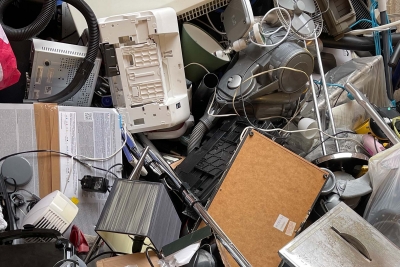
Universal waste is one that is generated largely from consumer products containing mercury, lead, cadmium, etc that are harmful to human health. This include everything from batteries and pesticides to even lamps. Importantly, these are things that cannot be disposed of as domestic waste but still likely to be done so, Segregation at source and recycling help in universal waste management.
Why Do We Care About Universal Waste?
The primary environmental concern with universal waste is the heavy metal components that can easily contaminate the land and ground water (such as lead, mercury, and other elements that can be toxic to humans and the environment). In addition, all heavy metals are easily recyclable, so it makes no sense to throw metals into a landfill when they can be reclaimed and recycled. For this reason, you will usually hear universal waste disposal companies referred to as recyclers.
On the topic of electronic waste (e-waste) dumps in particular, PBS’s Frontline produced a documentary called Ghana: A Digital Dumping Ground about the export of e-waste from developed to developing countries, creating toxic living conditions. Since the documentary was released, there has been much greater scrutiny of e-waste disposal practices in the U.S. and around the world. If you are unfamiliar with this “hidden” world of e-waste dumping, it may be eye-opening to watch the 20-minute video, which will explain the problems associated with these wastes in more depth than we can provide on this webpage.
The U.S. Environmental Protection Agency (EPA) maintains statistics on the management of used and end-of-life electronics (see table below). As you can see, less than half of the electronics disposed of in 2009 were collected for recycling. Further, it is unclear how much was recycled in an environmentally and civically responsible manner. For more information on responsible e-waste recycling options, visit the environmental best practice for managing universal waste section at the bottom of this webpage.
Environmental Best Practice for Managing Universal Waste
Use an e-Steward or R2 certified e-waste recycler
There are two leading certifications for the responsible management of electronic waste, also known as e-waste. As described in the section why do we care about universal waste, if not managed properly, electronic waste can contaminate the environment and pose a danger to human health. E-Stewards is a certification system for electronic waste recyclers. It demands that these recyclers manage e-waste responsibly, such as not sending it overseas and ensuring that all hazards are controlled and managed. For a complete list of what an e-Stewards certified recycler commits to, visit the What is the e-Stewards Standard? page. The R2 Standard is another certification system for electronic waste recyclers and offers certification to recyclers and refurbishers who commit to environmental responsibility and worker safety. The U.S. EPA refrains from endorsing one certification system over the other; however, they do offer additional information about both e-Stewards and R2 on their webpage certification programs for electronics recyclers.
Purchase electronics equipment that is EPEAT-rated
EPEAT is a program that began with a grant from the EPA and is now managed by the Green Electronics Council. The EPEAT rating system applies to computers, imaging equipment, and televisions, and gives a rating (bronze, silver, or gold) based on a number of factors, including reduction of environmentally sensitive materials, end-of-life design, product longevity, energy conservation, corporate performance, and packaging choices. Manufacturers can choose to have their products evaluated for an EPEAT rating and can publish their EPEAT rating to consumers. Most of the large electronics manufacturers use EPEAT to some degree, so the next time you are in the market for office or electronic equipment, consider purchasing models that are EPEAT-rated. Visit the EPEAT Registry Search for available products. For more information on EPEAT in general, visit the EPA’s environmentally preferable purchasing section.
Recycle alkaline and button cell batteries
Though you are not required to do so, there are valuable metals in these types of batteries. Best environmental practice is to collect these batteries for recycling with your universal waste recycler. This is very simple to do; set up pails or boxes labeled “battery recycling” – you may be surprised by how many you collect. You can also encourage your staff to bring in used batteries from home. It is inexpensive to recycle batteries and should thus be encouraged at any opportunity.
Donate appliances and e-waste instead of throwing it away
That said, you should be particularly careful about HIPAA – which means it may not always make sense to donate computers or laptops (anything with a hard drive) from healthcare facilities. However, there are good opportunities to donate items like appliances, medical equipment, computer monitors, keyboards, and other accessories, as long as they still have a useful life, are in good working condition, are clean, and your intent is that someone can actually use the items (not just a free way to get rid of your junk). You can list items for reuse on the Minnesota Materials Exchange.
Switch inefficient lighting for efficient lighting
According to the U.S. Energy Information Administration, lighting accounts for approximately 21% of electricity consumption in the commercial sector (including hospitals, clinics, etc.). Increasing lighting efficiency with CFLs, LEDs, and other efficient lighting options will help you save money and reduce your electricity load.
Credit : MN TAPE
Picture Credit : Google




